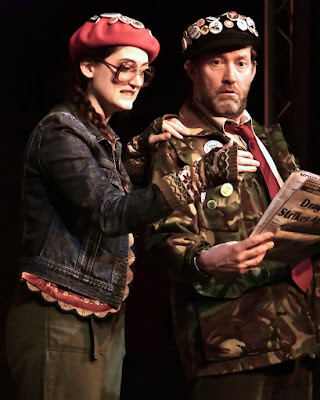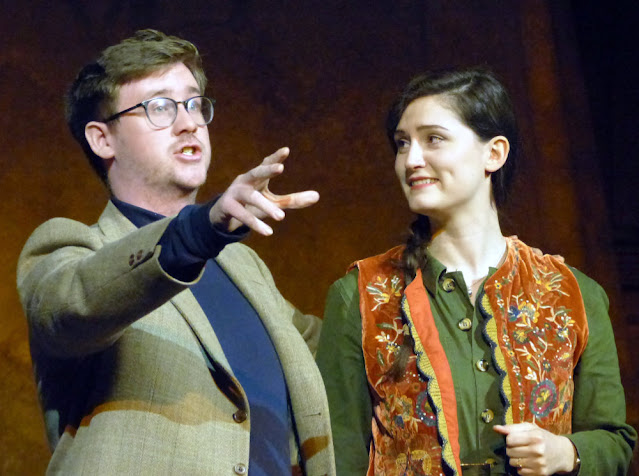 |
| Lampe: The Dragon of Wantley - Charlotte Badham - New Sussex Opera (Photo: Robert Knights) |
Lampe & Carey: The Dragon of Wantley; Ana Beard Fernandez, Charlotte Badham, Magnus Walker, Robert Gildon, director: Paul Higgins, conductor: Toby Purser, Bellot Ensemble; New Sussex Opera at the Theatre Royal, Winchester
Reviewed 28 April 2024
Updated to the 1980s miners' strike, New Sussex Opera's production mixes political satire and period style along with a sense of enjoyment in the work's send-up of opera seria
British theatre always seems to have been fond of music, Purcell's semi-operas were the musical spectaculars of their day and regular plays often included music. The development of ballad opera (songs based on pre-existing melodies with spoken dialogue) was a logical extension with most ballad operas, from The Beggar's Opera (1728) onwards having a satirical edge to them, usually making fun of the Italian opera seria as well as political hot potatoes of the day.
What took far longer to develop was a tradition of lighter, comic English operas. One notable example, which has been consistently undervalued, is John Frederick Lampe and Henry Carey's The Dragon of Wantley. Originally written in 1737 this was a fully sung English comic opera with newly composed music, yet its dramatic thrust has a lot in common with ballad opera, satire on Italian opera seria and poking fun at politics.
In the case of The Dragon of Wantley, the composer John Frederick Lampe had a secret weapon. He was the bassoonist in Handel's orchestra and had actually written opera seria. The Dragon of Wantley is a fully-developed opera seria yet sung to an English libretto which makes fun of the whole thing, allied to a ludicrous plot taken from a broadside ballad about a Yorkshire dragon defeated via a kick up the backside by a beer-swilling local knight. In Lampe's day, audiences understood the dragon in the plot was satirising Robert Walpole's tax policies, so there is a political point to all the fun.
 |
| Lampe: The Dragon of Wantley - Ana Beard Fernandez, Rob Gildon, Charlotte Badham - New Sussex Opera (Photo: Robert Knights) |
The Dragon of Wantley has come to attention again thanks to the excellent new recording on Resonus Classics [see my review], and now New Sussex Opera has taken up the gauntlet, staging the work and touring it around South East England. The tour opened in Lewes on 14 April, and we caught its stop at the Theatre Royal, Winchester on Sunday 28 April 2024. The production was by Paul Higgins with designs by Mollie Cheek. Toby Purser conducted the Bellot Ensemble, with Ana Beard Fernandez as Margery, Charlotte Badham as Mauxalinda, Robert Gildon as Gaffer Gubbins and the Dragon, and Magnus Walker as Moore of Moore Hall.
In order to provide that element of contemporary political satire that the original had, and prevent the work descending into some twee romp, director Paul Higgins and designer Mollie Cheek rather imaginatively set it during the 1980s miners' strike with Gaffer Gubbins (Robert Gildon) as the leader of the striking miners, first seen on the picket line. And Moore of Moore Hall (Magnus Walker) who helps them defeat the dragon is a local college lecturer (complete with requisite tweed jacket). In fact, the dragon only appears in the short final act (a neat coupe de theatre here) and much of the opera's action is taken up with Moore's romantic entanglements. He has been dallying with Mauxalinda (Charlotte Badham), but insists that his fee for killing the dragon is a kiss from Gaffer Gubbins' daughter, Margery (Ana Beard Fernandez). Cue all sorts of shenanigans, interlarded with copious amounts of drinking.
 |
| Lampe: The Dragon of Wantley - Ana Beard Fernandez, Rob Gildon New Sussex Opera (Photo: Robert Knights) |
But the opera is not strictly the rollicking farce that this might suggest because each time a singer opens their mouth, the result is a da capo aria (albeit compact), and Lampe works his way through all the different types of arias that might be expected. Charlotte Badham's feisty Mauxalinda has a terrific rage aria in Act One when she discovers that Moore is wooing Margery, whilst the act ends with a love duet for Moore and Margery (Magnus Walker and Ana Beard Fernandez). Act Two opens with a lament for Margery (Beard Fernandez), then the two women exchange insults in a duet based on the 'Rival Queens' trope. Threatened with jail, Mauxalinda (Badham) has her own lamenting aria, and Moore (Walker) ends Act Two with a vigorous aria before he goes to war with the dragon.
But at each stage, Henry Carey's libretto undercuts these situations wonderfully. His choice of similes is terrific ('my eyes are red as ferret's' at one point) so that the love duet is 'Pigs shall not be so fond as we' and Margery's Act Two lament is 'Sure my stays will burst with sobbing' whilst Moore's final aria before going to war is in celebration of the beer that fuels him.
Whilst ballad opera can be performed by singing actors, The Dragon of Wantley needs singers confident and stylish in early 19th century opera seria. New Sussex Opera's cast all took their roles seriously and whilst part of the fun came from the clash between music, word and dramatic situation, further fun came from the delightful seriousness of the performance including ornaments and cadenzas which were totally inappropriate for the dramatic situation. Higgins' production was thankfully never knowing, there was a seriousness of purpose to it which is the seat of all the best comedy.
Ana Beard Fernandez made a delightful Margery, rather intense and serious at first as she supported her Dad on the picket line, but then warming as she has her head turned by the dashing Moore (Magnus Walker). Walker made Moore a bit of a twit, certainly anti-heroic and this was emphasised in his behaviour in the showdown with Gildon's terrific dragon. Walker made a plausible lover and brought out Moore's two-facedness in the way he played off his two women. Charlotte Badham was terrific as Mauxalinda, really eating the scenery in just the right way, completely over the top whether in anger and vituperation, or desperation not to be sent before the law in Act Two. Robert Gildon was a great asset in the double role as the bluff, hearty Gaffer Gubbins with Gildon relishing the Handelian touches to the vocal line, and then giving us a vividly characterised dragon.
Designer Molly Cheek clearly had great fun sourcing 1980s period-style clothes (and someone had certainly gone overboard with the badges). The backdrop was a distressed image evoking a miners' banner though the distressing had been perhaps overdone and it was difficult to 'read' the image at all.
The chorus really got the bit between their teeth, clearly enjoying Lampe's vigorous choral writing as well as incarnating the feisty Yorkshire miners and their wives.
 |
| Lampe: The Dragon of Wantley - Magnus Walker, Ana Beard Fernandez, Rob Gildon, Charlotte Badham - New Sussex Opera (Photo: Robert Knights) |
In the pit, the period instrument Bellot Ensemble worked terrifically hard. We had two horns and two trumpets for the overture and some of the grander moments, the young players impressing in the way they tackled the high part writing. For most of the opera it was string quintet, two oboes and harpsichord, providing lively support with perhaps more vigour than style, but the result fitted in with the drama and the setting.
The singers worked hard with the English text and plenty of Henry Carey's crazier similes came through but sometimes the Lampe's more elaborate vocal writing mitigated against hearing the words and if companies are to make the most of this delightful and undeservedly neglected piece, then having the words available is something to be considered.
Lampe and Carey's work will always be best enjoyed by those who are in on the joke, who recognise the opera seria tropes that are being sent up. But there is much to enjoy in this witty and literate comedy. New Sussex Opera's production, lasting around two hours including interval, had plenty of verve and moved at a good pace. It was always delightfully engaging, and you sensed everyone having fun, with the soloists enjoying being able to send up a style of opera that they might be singing elsewhere.
Never miss out on future posts by following us
The blog is free, but I'd be delighted if you were to show your appreciation by buying me a coffee.
Elsewhere on this blog
- Lobesgesang: Mendelssohn's rarely performed symphony-cantata is a fine climax to Sir Andras Schiff and the OAE's exploration of the composer's symphonic music - concert review
- Fear no more: Brindley Sherratt on releasing his first recital disc - interview
- A German in Venice: Schütz alongside music he could have heard in Venice, a wonderfully life-affirming disc - record review
- Attention must be paid: the Engegård Quartet at Conway Hall in Mozart, Bartok, Maja Ratkje, and Fanny Mendelssohn - concert review
- Opera as it ought to be: Mozart's Don Giovanni from Hurn Court Opera reviewed by James McConnachie - opera review
- Leeds Lieder 2024
- A Leeds Songbook and a showcase performance: Leeds Lieder Young Artists 2024 - concert review
- A day of French song with a focus on Fauré, with Graham Johnson making us love the composer's late period, and James Gilchrist in fine form - concert review
- Engaging the audience: James Newby and Joseph Middleton in a folk-inspired programme at a cool Leeds café/bar - concert review
- The sound of an image: recent chamber music by New York City-based, Puerto Rican-born composer Gabriel Vicéns - record review
- A City Full of Stories: Anna Phillips on her work with Academy of St Martin in the Fields' SoundWalk - guest posting
- Energy, discipline, & sheer love of music-making: National Youth Orchestra & National Youth Brass Band in Gavin Higgins - concert review
- No boundaries or rules: Yorkshire-based Paradox Orchestra is reinventing the orchestral concert - interview
- Full of good things: Sean Shibe and the Dunedin Consort in John Dowland, a new Cassandra Miller concerto and much else besides - concert review
- Home

.jpg)









No comments:
Post a Comment